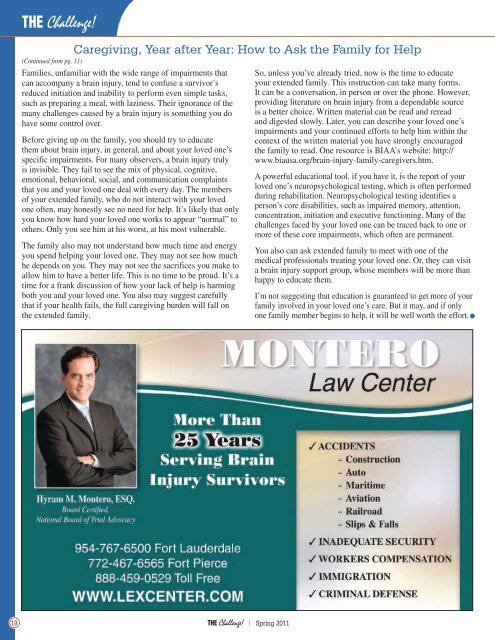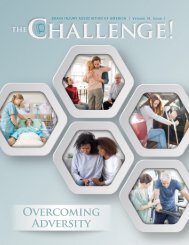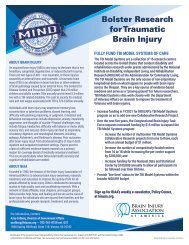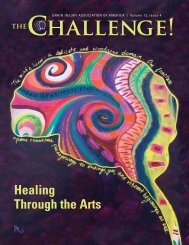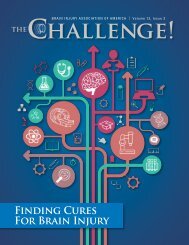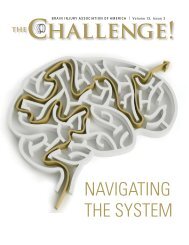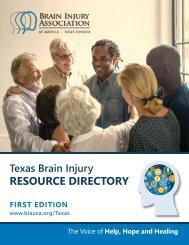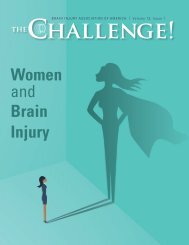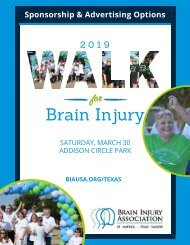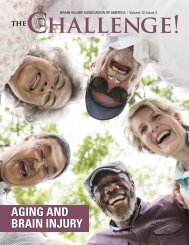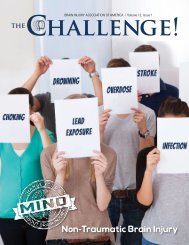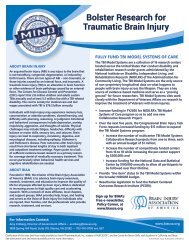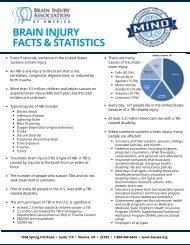THE Challenge! Spring 2011
Communication
Communication
Create successful ePaper yourself
Turn your PDF publications into a flip-book with our unique Google optimized e-Paper software.
<strong>THE</strong> <strong>Challenge</strong>!<br />
Caregiving, Year after Year: How to Ask the Family for Help<br />
(Continued from pg. 11)<br />
Families, unfamiliar with the wide range of impairments that<br />
can accompany a brain injury, tend to confuse a survivor’s<br />
reduced initiation and inability to perform even simple tasks,<br />
such as preparing a meal, with laziness. Their ignorance of the<br />
many challenges caused by a brain injury is something you do<br />
have some control over.<br />
Before giving up on the family, you should try to educate<br />
them about brain injury, in general, and about your loved one’s<br />
specific impairments. For many observers, a brain injury truly<br />
is invisible. They fail to see the mix of physical, cognitive,<br />
emotional, behavioral, social, and communication complaints<br />
that you and your loved one deal with every day. The members<br />
of your extended family, who do not interact with your loved<br />
one often, may honestly see no need for help. It’s likely that only<br />
you know how hard your loved one works to appear “normal” to<br />
others. Only you see him at his worst, at his most vulnerable.<br />
The family also may not understand how much time and energy<br />
you spend helping your loved one. They may not see how much<br />
he depends on you. They may not see the sacrifices you make to<br />
allow him to have a better life. This is no time to be proud. It’s a<br />
time for a frank discussion of how your lack of help is harming<br />
both you and your loved one. You also may suggest carefully<br />
that if your health fails, the full caregiving burden will fall on<br />
the extended family.<br />
So, unless you’ve already tried, now is the time to educate<br />
your extended family. This instruction can take many forms.<br />
It can be a conversation, in person or over the phone. However,<br />
providing literature on brain injury from a dependable source<br />
is a better choice. Written material can be read and reread<br />
and digested slowly. Later, you can describe your loved one’s<br />
impairments and your continued efforts to help him within the<br />
context of the written material you have strongly encouraged<br />
the family to read. One resource is BIAA’s website: http://<br />
www.biausa.org/brain-injury-family-caregivers.htm.<br />
A powerful educational tool, if you have it, is the report of your<br />
loved one’s neuropsychological testing, which is often performed<br />
during rehabilitation. Neuropsychological testing identifies a<br />
person’s core disabilities, such as impaired memory, attention,<br />
concentration, initiation and executive functioning. Many of the<br />
challenges faced by your loved one can be traced back to one or<br />
more of these core impairments, which often are permanent.<br />
You also can ask extended family to meet with one of the<br />
medical professionals treating your loved one. Or, they can visit<br />
a brain injury support group, whose members will be more than<br />
happy to educate them.<br />
I’m not suggesting that education is guaranteed to get more of your<br />
family involved in your loved one’s care. But it may, and if only<br />
one family member begins to help, it will be well worth the effort.<br />
19<br />
<strong>THE</strong> <strong>Challenge</strong>! | <strong>Spring</strong> <strong>2011</strong>


